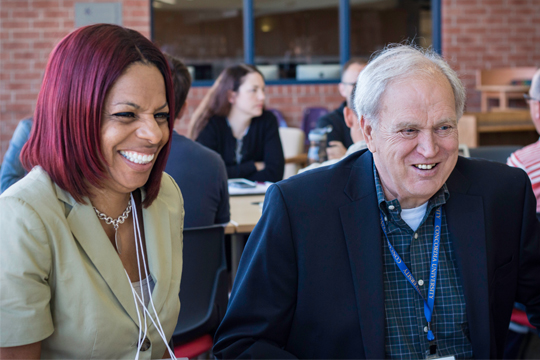 Dr. Elliott Moeser, Concordia professor and executive director of the CAGC, talks about school data with Monica Brown of the Brown Deer School District during a June equity institute.
Dr. Elliott Moeser, Concordia professor and executive director of the CAGC, talks about school data with Monica Brown of the Brown Deer School District during a June equity institute.
School may be out for the summer, but for nearly 200 educators, work is still underway to address the achievement gap within their schools.
Administrators and teachers from six area school districts on Thursday wrapped up a three-day, intensive “equity institute” that had the educators pouring over school data and wrestling with tough questions in order to find a way to change Wisconsin’s status as the state with the highest incidents of achievement gaps in the nation.
The institute, held at Homestead High School, was sponsored by the Closing the Achievement Gap Consortium (CAGC), which aims to embrace and change school practices, instruction and methodology that perpetuate achievement gaps.
School districts that attended the June 27-29 event included: Mequon-Thiensville, Brown Deer, Fox Point-Bayside, Maple Dale-Indian Hill, Racine, Whitefish Bay and Greenfield. In addition to those six, 19 other public, private, parochial, voucher and choice schools and school systems in southeastern Wisconsin make up the CAGC.
“We determined that we could do more work together than apart as far as closing the achievement gap,” said Dr. Elliott Moeser, professor at Concordia University Wisconsin and executive director of the CAGC. “We are a group of action. This is an example of doing something that is positive, something that will change the lives of students.”
CAGC partnered with Integrated Comprehensive Systems for Equity (ICS for Equity) to offer the sessions. This is the second equity institute CAGC has sponsored this summer and the second year in a row CAGC schools have participated. In total, some 850 educators and administrators from 14 area school districts have gone through the equity training.
On Tuesday, the first day of the institute, ICS for Equity co-founder Dr. Colleen Capper set the stage for the work that was to come.
“We can’t keep doing the same thing and stay comfortable,” Capper told those assembled. “Staying comfortable isn’t going to help us create equity in our school districts. We’re really going to ask you to step out of your comfort zones and think critically about the work that you’ve been doing.”
From 8 a.m. to 3 p.m. each day, attendees participated in a variety of thought-provoking group activities. Some of the groups’ work included drafting new lesson plans or altering existing ones to respond to research, as well as brainstorming ways subject area teachers can cooperate with special education teachers so that students with special needs can remain in the classroom and no learning time is lost.
“Collaborating to implement best practices and ensure equity is intense and important work,” said Matt Joynt, the soon-to-be superintendent of the Mequon-Thiensville School District. “The fact teams of educators spent days during the summer reviewing and creating systems in their schools to better guarantee the future success of all students is proof that we are no longer simply talking about achievement gaps; we are actively working together to make the success of all students central to our institutional vision, advocacy and practice.”
— This story is written by Kali Thiel. Kali was Director of University Communications until April, 2025.
If this story has inspired you, why not explore how you can help further Concordia's mission through giving.